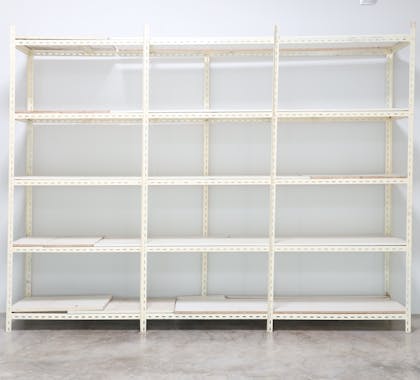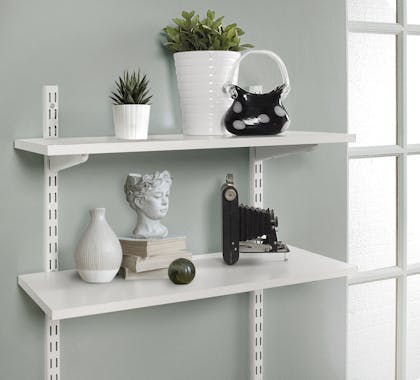
What are shelf brackets?
Shelf brackets are essential support components that securely hold up shelves in place against a wall. They come in various styles and materials, making them ideal for a wide range of interior styles. Not only do they provide stability and weight support, they also enhance the overall look of your shelving setup.

Equipment you’ll need to put up your shelf with brackets
Having the correct equipment is essential for a safe and secure shelf bracket installation. What you’ll need to put up a shelf with brackets includes:
- Shelf
- Shelf brackets
- Screws
- Wall plugs
- Drill
- Masking tape
- Stud, pipe, and cable detector
- Hammer
- Pencil
- Screwdriver
- Spirit level
Single vs twin slot shelving systems
Single and twin slot shelving systems are both versatile support structures for shelves, offering unique strengths and configurations. When choosing between them, it’s important to consider the items you plan to store on the shelves, how adjustable you want the shelves to be, and what will complement your existing interior.
- Single slot shelving systems feature uprights with one vertical row of slots per shelf bracket. They are suited to lighter loads and smaller shelving areas in domestic settings and are a simpler and more discreet option, ideal for bedrooms and home offices.


- Twin slot shelving systems use uprights with two parallel slots, allowing for more stability and weight distribution. This makes them ideal for heavier usage and wider shelving setups, such as in garages and offices.


Common mistakes to avoid when putting up a shelf with brackets
While putting up a shelf with brackets may seem straightforward, there are a few common mistakes that can affect both the stability and appearance of the shelf. Avoiding these common mistakes when putting up your shelf and brackets can create a more secure installation with a seamless finish.
Not checking for pipes, cables, or studs
Drilling without checking the wall for pipes, electrical cables, or studs can lead to costly damage or safety hazards. Using a detector tool before installing your shelf and brackets is essential, ensuring you’re drilling into a safe and suitable spot.
Using the wrong fixings for your wall type
Using the wrong fixings for your wall type can lead to shelves becoming unstable or falling off entirely. Different wall types require specific fixings for the shelf to stay securely in place. For example, using standard plugs on plasterboard can lead to instability or a collapse, so it’s important to match the fixings to your wall material.
Failing to use a spirit level
Failing to use a spirit level can result in uneven shelves. Not only does this look unprofessional, but it can also cause items to slide off. It’s important to check for an even level to ensure a tidy and functional installation.
Not securing brackets properly
Loose or poorly fixed brackets are likely to shift over time, causing shelves to become wobbly or even fall. Brackets must be tightly fastened with the correct screws to ensure stability and safety.
Choosing the wrong size or type of bracket
Selecting a bracket that’s too small or unsuitable for the shelf’s weight can lead to sagging or failure. The bracket should support the full depth of the shelf and must be strong enough to support the intended load.
How to put up a shelf with brackets
Once you’re aware of the common issues to look out for and have the necessary tools at hand, you can begin installing your shelf with brackets. For the best results, be sure to follow the tips and tricks outlined in our guide to make the process even easier.

Step 1: Mark out your bracket placement
Once you’ve gathered the necessary equipment, mark out your bracket placement to avoid any unnecessary drilling. Use a stud, pipe, and cable detector to check that the wall is safe to drill. Follow this step by using a pencil and masking tape to mark bracket positions, ensuring there’s even spacing and height. A spirit level should also be used to check that the marks are straight before drilling.
Step 2: Drill holes and insert wall plugs
Once you have marked out the bracket positions, use a drill to make holes in these areas. This should be followed by tapping in wall plugs with a hammer to ensure the screws hold securely, especially in masonry and plasterboard walls.
Step 3: Attach the shelf brackets
Begin attaching the shelf brackets by aligning them over the wall plugs. Use a screwdriver to fasten them in place with screws, making sure each bracket is level and secure before moving on to the next step.
Step 4: Position and secure the shelf
You are now ready to position the shelf on the installed brackets, using a spirit level to check its evenness. Secure the shelf onto the brackets using additional screws if required by your bracket design.
Step 5: Final check
Now that your shelf and brackets have been put up, it’s time to check that the installation is stable and secure, ensuring that all the screws are tight. Once this has been checked, you can begin making use of your successfully installed shelf.

Discover shelving brackets at IronmongeryDirect
This guide has shown you how to successfully put up a shelf with brackets, teaching you the common mistakes to avoid for a smooth installation. Put up your shelf with brackets with ease using our wide range of high-quality shelf brackets from IronmongeryDirect.
FAQs
How far apart should shelf brackets be spaced?
Shelf brackets should be spaced roughly 40 to 60 cm apart, but this can vary depending on the length of your shelf and the support required. Heavier or longer shelves may need closer spacing or extra brackets for better support.
Can I put up a shelf on plasterboard walls?
Yes, you can put up a shelf on plasterboard walls. It’s important to use appropriate wall plugs designed for plasterboard to ensure the shelf is secure and can hold weight safely.
What weight can a shelf with brackets hold?
The weight that a shelf with brackets can hold depends on the type and size of the brackets, the shelf material, and how securely it's fixed. Check the manufacturer's guidelines and ensure you use the right fixings for your wall type before installation.
How do I make sure my shelf is level?
Using a spirit level when marking bracket positions and when placing the shelf is key to ensuring your shelf is level. Check before drilling to help avoid crooked shelves and maintain a professional finish.
Can you put up shelves without drilling holes?
While some shelves can be mounted using adhesive strips or tension rods, these methods usually support only lightweight items. For heavier or more secure shelving, drilling and using proper fixings is recommended to ensure safety and stability.
How far can a shelf extend past a bracket?
A shelf can generally extend to about 5 to 10cm beyond a bracket without compromising its stability. Larger overhangs require stronger brackets and thicker shelves to prevent sagging or damage.
